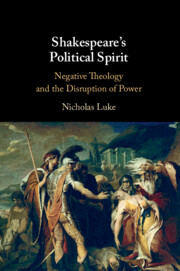Book contents
- Shakespeare’s Political Spirit
- Shakespeare’s Political Spirit
- Copyright page
- Contents
- Acknowledgements
- Introduction
- Chapter 1 Jack Cade in a Time of Protest
- Chapter 2 The Spirit of Caesar and the Second Circle
- Chapter 3 Coriolanus and the Work of Spirit
- Chapter 4 Not to Be – To Be
- Chapter 5 The Tempest and the Spirit of the Air
- Afterword
- Notes
- Works Cited
- Index
Chapter 4 - Not to Be – To Be
Hamlet, Kierkegaard, and the Eternal in Time
Published online by Cambridge University Press: 12 December 2024
- Shakespeare’s Political Spirit
- Shakespeare’s Political Spirit
- Copyright page
- Contents
- Acknowledgements
- Introduction
- Chapter 1 Jack Cade in a Time of Protest
- Chapter 2 The Spirit of Caesar and the Second Circle
- Chapter 3 Coriolanus and the Work of Spirit
- Chapter 4 Not to Be – To Be
- Chapter 5 The Tempest and the Spirit of the Air
- Afterword
- Notes
- Works Cited
- Index
Summary
Hamlet is thrown into a state of uncertainty about the eternal. Indeed, his famed “delay” is a response to the thought of eternity. He is given “pause” by imagining “what dreams may come / When we have shuffled off this mortal coil”. The eternal is the “rub”. The chapter tackles this obscure rub by turning to Soren Kierkegaard, who references Hamlet’s famous soliloquy in his Philosophical Fragments. Resurrection, for Kierkegaard, is a movement through non-being to being. Negativity here plays a critical role. To be “born again”, the learner must “become[] nothing and yet … not [be] annihilated”. Hamlet’s struggle with the eternal opens him to an expansive view of humanity that goes beyond Claudius’s will to power or Laertes’s customary honour. It brings him to a new political vision, outside the violent and reductive dynastic politics of Denmark. Hamlet seeks what would seem impossible within revenge tragedy: the incalculable. The “eternal” is here used in an inclusive sense to show how the obscure but liberating thought of the timeless or untimely allows ideas of justice, charity, equality, and forgiveness to enter the play. The eternal suggests an imaginary perspective that negates our current preoccupations and political economies.
Keywords
- Type
- Chapter
- Information
- Shakespeare's Political SpiritNegative Theology and the Disruption of Power, pp. 151 - 189Publisher: Cambridge University PressPrint publication year: 2024

